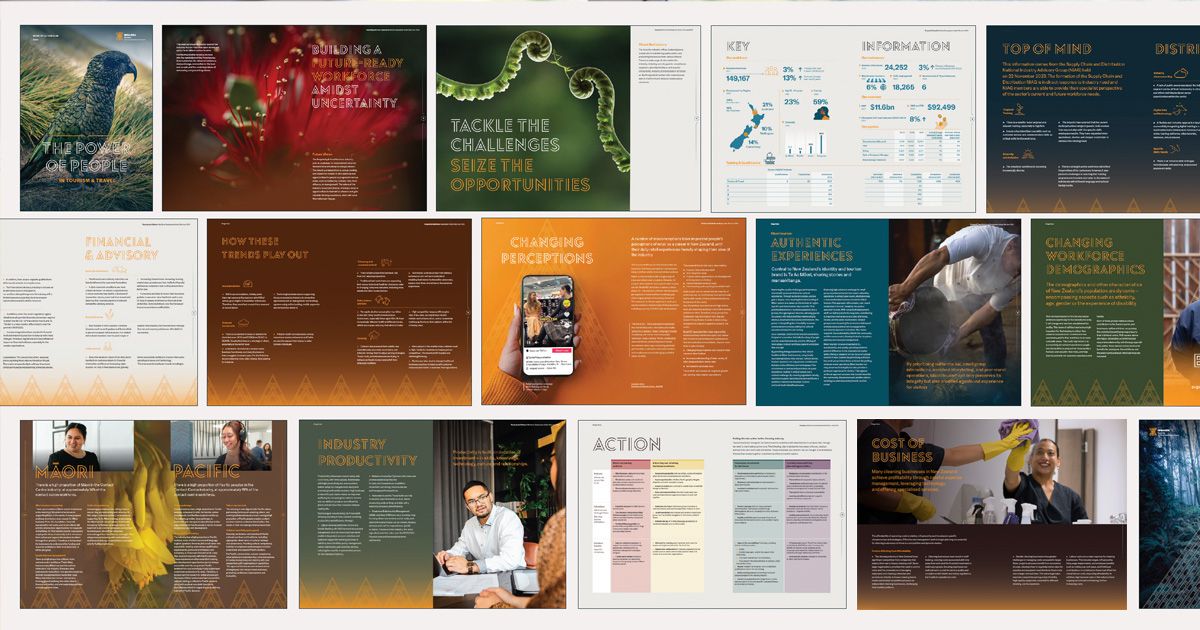
The challenge of upskilling workers when it’s tough for businesses to meet their bottom lines is among the most notable trends Ringa Hora Strategy and Advice Manager Leo Shen has found in the organisation’s workforce development planning documents for the year.
Ringa Hora is releasing its 2024 Workforce Development Plan (WDP), which outlines overall themes for the Service sector workforce, and 10 Industry Action Plans (IAPs) for each of the industries that make up the Service sector that Ringa Hora looks at.
These plans are one of the core responsibilities of the Strategy and Advice team that Leo oversees, and they play an important role for Service sector businesses.
“The depths of thinking and the detailed understanding of the industry is what make these documents unique,” Leo says.
“Not everyone in our industries have the opportunity to go out there and talk to, hundreds and hundreds of businesses. These plans let us take all those amazing insights from people who share with us and then put them on simple to understand words.
“This is our third year in developing and crafting these documents and you will see year on year how we drill further and further down into the layers of what’s really important for businesses, what are some of the areas of actions, and how can we start to effect change.”
 Leo comes to Ringa Hora with a background with marketing and data analysis for public services such as MBIE and MSD, along with non-governmental organisations (NGOs) and the private sector. He made his way to Ringa Hora shortly after its formation.
Leo comes to Ringa Hora with a background with marketing and data analysis for public services such as MBIE and MSD, along with non-governmental organisations (NGOs) and the private sector. He made his way to Ringa Hora shortly after its formation.
“I came during Covid, which was a really interesting turning point in the NGO sector. I was doing lots of great stuff, but I was excited to join an organisation that can affect change for generations for hundreds of thousands of people.
“The chance to work alongside industry to ensure we create the next paths forward, and really thinking about what’s required in the future, with Ringa Hora has been a really exciting one.”
Ringa Hora has been working with the Service sector at a time when many businesses have had to deal with inflation and downturns, something Leo says is reflected in the industry action plans.
“We are at a slight turning point in a way,” he says.
“In the medium to longer term, the Service sector will continue to grow alongside population growth and the economy, and to get to our desired future, you absolutely need a skilled workforce.
“Nevertheless, with the economic slowdown, the opportunity for industry to invest in skills is very, very limited. It is probably the most startling challenge that we are seeing right now.”
Leo says Ringa Hora has been able to play an important role with industries during the downturn, having the opportunity to work with them on long-term visions at a time when the short term is the biggest focus for many of them.
“With many business owners working 12-14 hour days just to ensure their businesses stay afloat, having the capacity to think about the future is a scarce resource that many of them simply don’t have the luxury to be able to do.
“It adds to the challenge and emphasis around how much better your product or proposed solution needs to be for that to take hold with industry.
“We have the privilege to live and breathe what business is, and also to consider what some of the longer-term narratives are. Being able to balance those out is one of the areas where we add the most value.”
Previous IAPs and WDPs have been well used by industry associations as they look at the best ways forward for their businesses, and Leo has been particularly interested in the plans put forward for some of the smaller Service sector industries.
“I find the plans about industries like cleaning, security, and contact centres really interesting, because they present the detailed views, opportunities, and challenges facing these ultra-important industries that are not often talked about.
“That’s where I think these documents add the most value, because these are the ones that are perhaps not that obvious to general audiences but which play a super, super important role in Aotearoa.”
